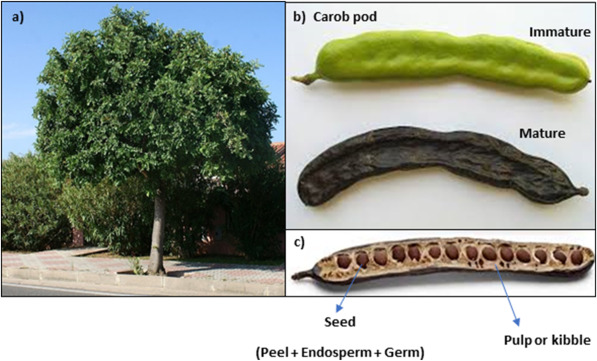Carob (Ceratonia siliqua), often referred to as the “chocolate’s healthy cousin,” is a lesser-known but highly nutritious legume that has been cherished for centuries. Originating from the Mediterranean region, the carob tree produces pods filled with sweet, edible pulp that can be processed into a powder, syrup, or whole pod. Due to its natural sweetness and versatility, carob has been used in various culinary applications as a sugar alternative and a healthier substitute for chocolate.
In this article, we will explore the numerous benefits of carob and its homemade uses, from its nutritional profile to how you can incorporate it into your daily meals.
Nutritional Profile of Carob
Carob is a rich source of fiber, vitamins, and minerals. Unlike cocoa, carob is naturally sweet, which makes it an excellent alternative for people who are trying to reduce their sugar intake or avoid the bitterness of chocolate. Here’s a quick overview of its nutritional content:
- Calories: Carob is relatively low in calories, making it a great choice for those who are looking to control their weight.
- Fiber: One of the standout features of carob is its high fiber content. A 100-gram serving of carob powder contains about 40 grams of fiber, which aids in digestion, promotes gut health, and supports weight management.
- Vitamins and Minerals: Carob is packed with vitamins and minerals, including calcium, potassium, iron, magnesium, and B-vitamins like folate. These nutrients are vital for bone health, heart health, and overall well-being.
- Antioxidants: Carob contains antioxidant compounds, including flavonoids, that help fight oxidative stress in the body and may reduce the risk of chronic diseases.
- Naturally Caffeine-Free: Unlike chocolate, carob is naturally caffeine-free, making it a great option for those who are sensitive to caffeine or want to reduce their intake.
Health Benefits of Carob
- Rich in Fiber for Digestive Health One of the primary benefits of carob is its high fiber content, which aids in digestion and helps prevent constipation. The soluble fiber in carob can also promote gut health by fostering the growth of beneficial gut bacteria.
- Supports Heart Health Carob’s high fiber content, combined with its potassium, magnesium, and antioxidant properties, makes it an excellent food for supporting heart health. Potassium helps maintain healthy blood pressure, while magnesium contributes to normal heart rhythm and function. The antioxidants in carob can also reduce inflammation and lower the risk of cardiovascular diseases.
- Helps Manage Blood Sugar Levels Carob has a low glycemic index, meaning it has a minimal impact on blood sugar levels compared to regular sugar or chocolate. This makes it a suitable treat for people with diabetes or those who are trying to manage their blood sugar levels. The fiber in carob also helps slow down the absorption of sugar, further stabilizing blood glucose levels.
- Rich in Calcium for Bone Health Carob contains a significant amount of calcium, which is essential for maintaining strong bones and teeth. Regular consumption of carob can contribute to better bone density and may help prevent conditions like osteoporosis.
- Natural Antioxidant Power Carob is packed with antioxidants that protect the body from free radical damage. These antioxidants, including flavonoids and polyphenols, help neutralize harmful molecules and support the body’s defense against aging and disease.
- Caffeine-Free Energy Boost Carob is naturally caffeine-free, making it a great option for people who need an energy boost without the stimulating effects of caffeine. It provides a gentle pick-me-up, thanks to its natural sugars and carbohydrates, without the crash that often follows caffeine consumption.
Homemade Uses of Carob
Carob’s versatility allows it to be used in a wide variety of homemade recipes. Whether you’re using carob powder, carob syrup, or whole pods, there are endless ways to incorporate this nutritious ingredient into your meals.
1. Carob Powder as a Chocolate Substitute
Carob powder is often used as a healthy alternative to cocoa powder in baking. It has a naturally sweet taste and can be substituted in a 1:1 ratio for cocoa powder in most recipes. Some popular uses include:
- Carob Brownies: Swap out cocoa powder for carob powder in your favorite brownie recipe. The result is a rich, fudgy dessert with the added benefit of carob’s fiber and nutrients.
- Carob Smoothies: Add a tablespoon of carob powder to your smoothies for a sweet, chocolatey flavor without the caffeine.
- Carob Energy Bars: Combine carob powder with oats, nuts, and honey to create a delicious and healthy energy bar.
2. Carob Syrup as a Sweetener
Carob syrup, which is made by boiling down carob pods into a thick, sweet liquid, is an excellent substitute for maple syrup or honey. You can use carob syrup as a topping for pancakes, waffles, or yogurt. It can also be drizzled over oatmeal or used in baking recipes that call for liquid sweeteners.
3. Carob Chips
Carob chips are a great alternative to chocolate chips, especially for people who are sensitive to caffeine or want to avoid added sugars. You can easily make carob chips at home by melting carob powder with coconut oil and pouring it into small molds. Once cooled, these chips can be added to cookies, muffins, or granola bars.
4. Carob Smoothie Bowl
Carob pairs wonderfully with other fruits and vegetables in smoothie bowls. Blend frozen bananas, berries, and a tablespoon of carob powder to create a creamy and nutrient-packed base. Top with nuts, seeds, and granola for a satisfying and energizing breakfast.
5. Homemade Carob Lollipops
If you’re in the mood for a fun DIY project, you can make homemade carob lollipops. Melt carob powder with coconut oil, add your favorite natural sweeteners, and pour the mixture into lollipop molds. Allow the lollipops to set in the refrigerator, and enjoy a delicious, naturally sweet treat.



